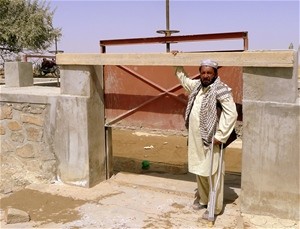
Paktika Province farmer, Haji Lal Khan, stands at a water gate connecting the Paltu River intake with the Sra Kala can-al.
USAID/CADG
With no sustainable irrigation infrastructure in place, farmers from Sra Kala in Paktika province could not afford the costs of channeling wa-ter from the local river to their fields.
8 OCTOBER 2012 | PAKTIKA, AFGHANISTAN
“I do not have enough money to bring water from the river to my farm, so my fields are dry,” says 52-year-old Haji Lal Khan. The sole supporter of a family of 13, Haji Khan has spent the better part of his adult life as a driver-for-hire, while considering himself a farmer.
Haji Khan’s predicament is common among the residents of Sra Kala and the villages surrounding Sharana, the capital of Paktika Province. Sharana’s main water source, the Paltu River, runs dry for all but a few months each year. When the river is flowing, Sra Kala residents construct sand berms across the riverbed, diverting a portion of the Paltu’s flow into the Sra Kala canal and nearby fields. While useful, these sand constructions erode quickly, causing sediment build-up in local canals and reducing the amount of water delivered to local farms.
For as long as Haji Khan can remember, only the wealthiest Sra Kala villagers have been able to farm their land with any success. “We have to hire men to build the berms. We have to pay for tractors and generators and fuel for water pumps to draw water from the canals,” Haji Khan explains. “Ninety percent of us do not have the money.” Rather than tend their land, the majority of local farmers are forced to seek insecure daily labour work in the Sra Kala bazaar to feed their families.
In an effort to help the farmers of Sra Kala, USAID and its implementing partner, Central Asia Development Group (CADG), recently collaborated with Afghan government officials and more than 400 short-term, community-based laborers to reinforce a 230-meter-long concrete intake linked to the Paltu River. Coupled with repairs to the Sra Kala canal and water gates that will channel river flow to four local villages, this intake dramatically will improve the lives of 2,500 local families by solving the water-access problems that limit area agricultural output.
“It used to take five hours to get water from the river to the fields; now it will only take one,” Haji Khan says, beaming. “And now, everyone will have the water they need.”







Comment
Make a general inquiry or suggest an improvement.